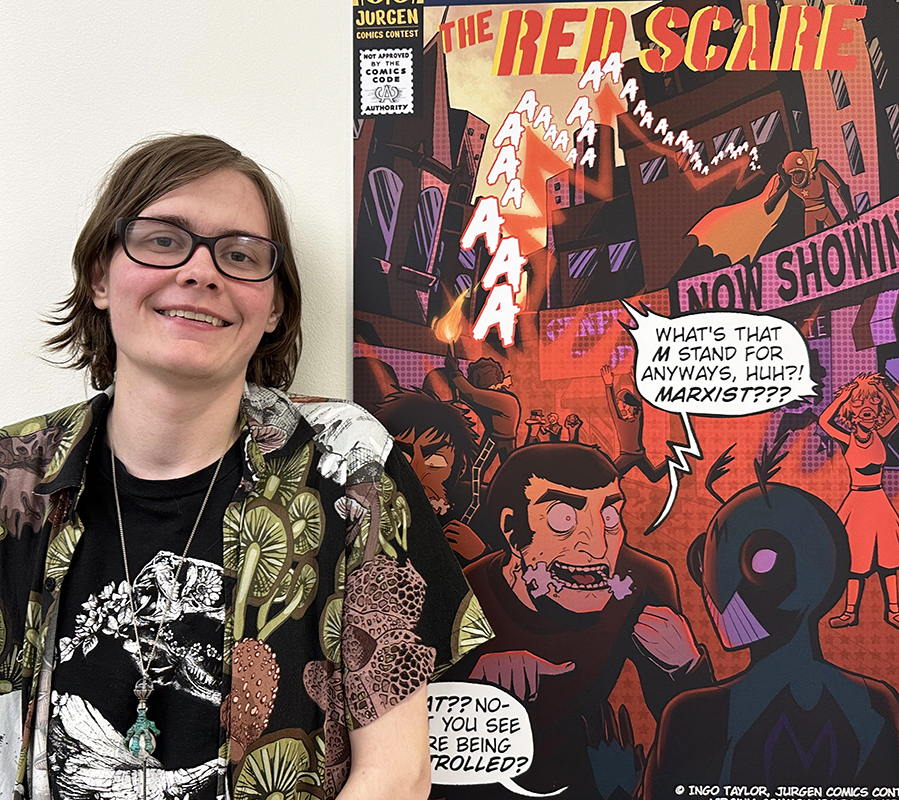
Announcing the winners of this year’s contest!
2025 Grand Prize: Ingo Taylor — The Red Scare
Artistry: Alyssa Hwee — Of Kings and Queens
Storytelling: Ana Gonzalez — Blacklisted. Hollywood 1950
Research: Naomy Cardoso Perez — To and From Guantanamo Bay
Honorable mention: Heciel — Carpetas. | 1. Vuelo Blanco;
Winston Broiles — The Boondocks; Nathan Persson – The War on Degenerate Art
View their award-winning artwork on Scholars Compass!

The 2024-2025 challenge
Imagine a comic book centered around the suppression or censorship of visual art, books, music, film or performance at a particular historical moment. You might tell this story using any one of a number of comic book genres such as real life, comedy, horror, romance, weird/uncanny, fantasy or science fiction.
Now draw only the comic book’s cover.
Winning entries needed to
- Stimulate readers’ interest in a story centered on a specific historical incident of censorship or suppression and the ideas and issues at stake
- Skillfully and engagingly communicate an understanding of the event
- Demonstrate innovative use of the standard U.S. comic book cover format
- Suggest one or more of the larger issues you’d imagine including in your comic such as censorship and self-censorship, art as a business vs. art for self-expression, art and its audiences, and the tension between artistic freedom and community standards
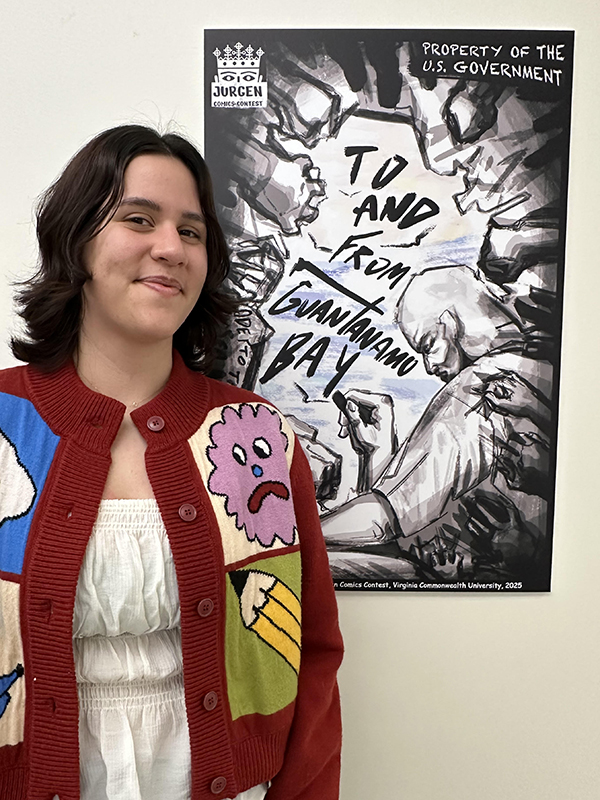

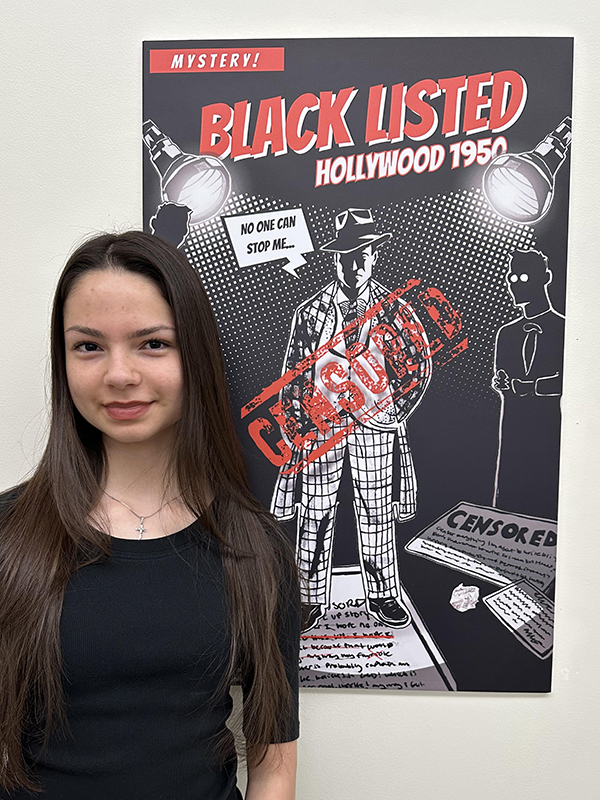
Prizes
- Grand prize (Best overall): $1,000 and print and digital publication
- Artistry $250 and print and digital publication
- Storytelling $250 and print and digital publication
- Research $250 and print and digital publication
- All entries considered for digital publication as honorable mentions
- Only one prize per person
Getting started
Among the many examples of art censorship:
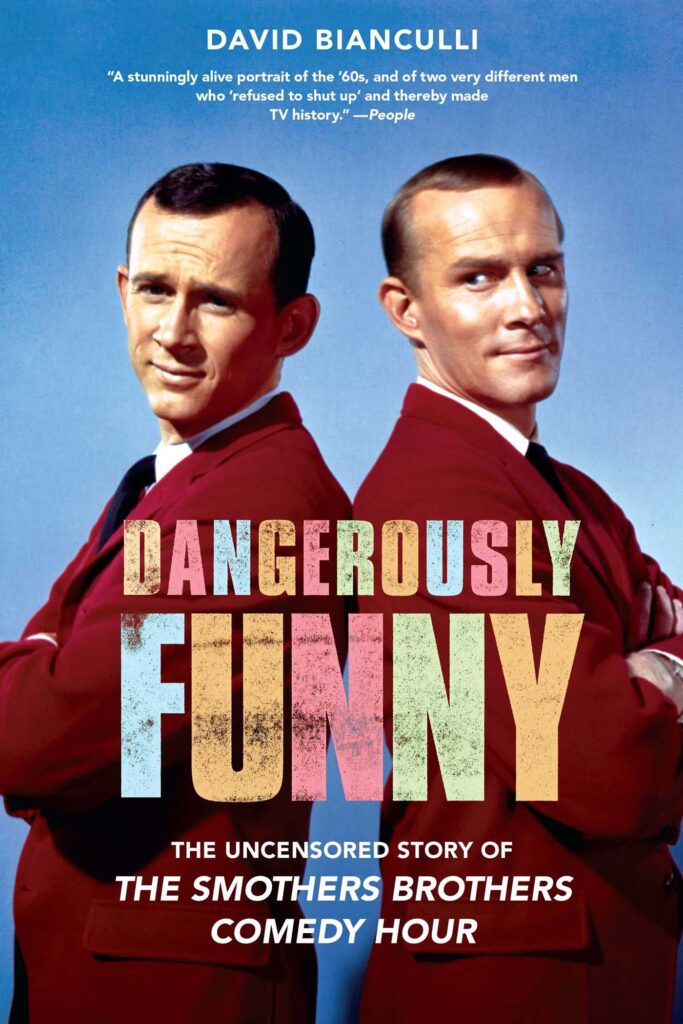
- Tom and Dick Smothers were “dangerously funny” comedians who challenged the censors at CBS with political humor on their The Smothers Brothers Comedy Hour. Pete Seeger’s performance of the song “Waist Deep in the Big Muddy” was famously cut from the show.
- The repeated censorship of director Amy Heckerling’s film Fast Times at Ridgemont High
- The attempted censorship of “Judgment Day” a comic in EC Comics Weird Fantasy, No. 18, March/April 1953
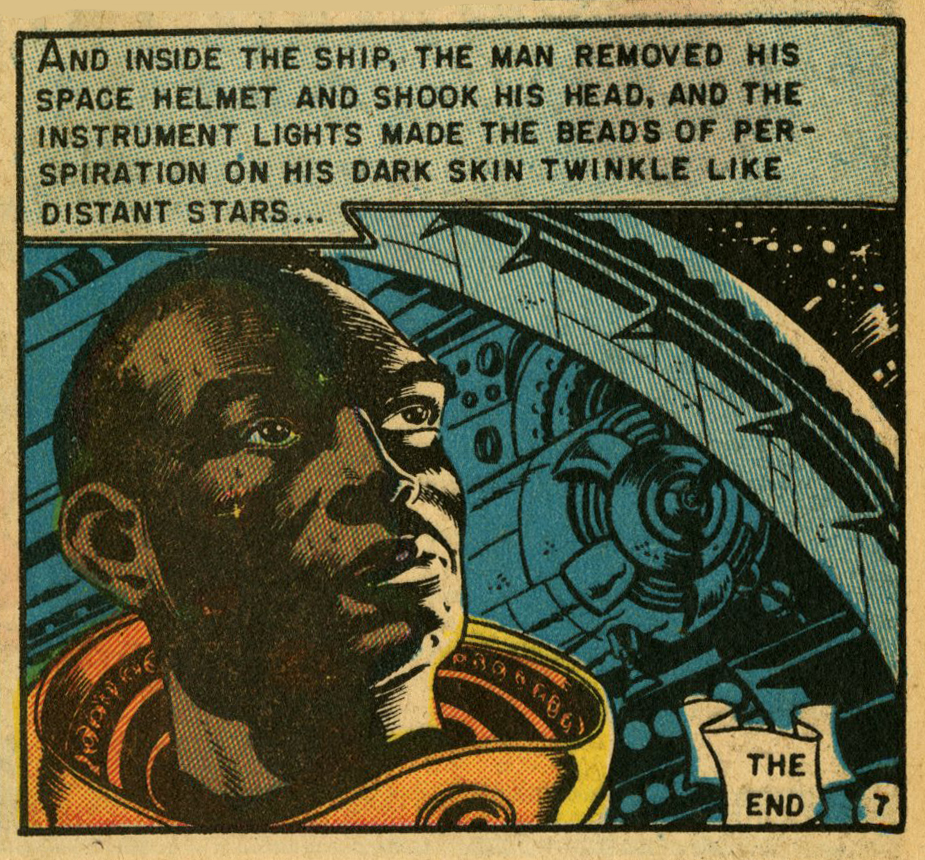
Weird Fantasy, no. 18, Mar/Apr 1953
- Opposition to The Rabbits’ Wedding a children’s picture book by Garth Williams, illustrator of Charlotte’s Web
- Marina Abramović’s Imponderabilia, shut down as obscene in 1977, is adapted by the artist for a 2023 retrospective.
- Challenges and bannings of Persepolis Marjane Satrapi’s graphic memoir
- The banning of Jurgen: A Comedy of Justice by James Branch Cabell
- Nazi Party suppression of German modernist art, which was labelled “Degenerate Art“
- PEN America v. Escambia County School District – a recent lawsuit asserting that Florida County School Board unlawfully removes or restricts access to books on race, racism and LGBTQ identities
- FCC v. Pacifica Foundation (George Carlin’s “Seven Dirty Words” routine for which the comedian was arrested.)
- Police stand by during a 1960 Tom Lehrer concert to prevent the satirical songwriter from performing several darkly humorous and “tasteless” numbers.
- In January 2025, after The Washington Post refuses to publish a cartoon critical of the newspaper’s owner and other billionaires, Pulitzer Prize-winning editorial cartoonist Ann Telnaes resigns.
Other resources:
- The world’s first museum of censored art, The Museu de l’Art Prohibit.
- PEN American Index of School Book Bans – 2022 -2023
- Banned Comics: Case Files, Comic Book Legal Defense Fund
- Banning Books in Prisons, Equal Justice Initiative
- VCU Access to The Washington Post and The New York Times
- Jurgen Banned Art Comics Contest Research Guide
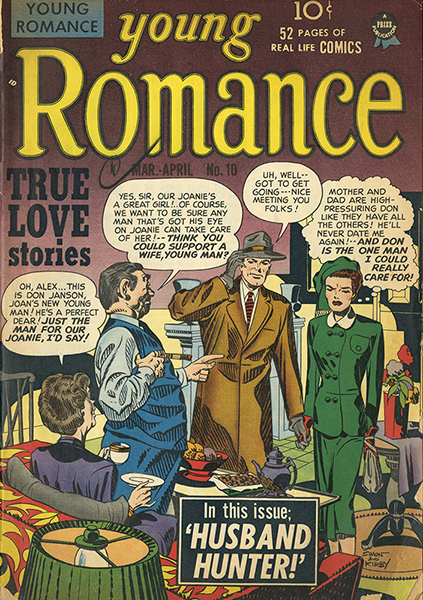 Submission requirements
Submission requirements
Eligibility: VCU students enrolled in 9 or more credit hours during the Fall 2024 semester. Part-time VCU students, including university employees who are taking classes, are also encouraged to participate. Their entries are eligible for digital publication, but will not be considered for cash prizes.
Format:
- Vertical format U.S. standard comic book cover
- Submitted as a digital file; sized as an 11″ x 17″ original, 300 dpi PDF
- Note: Should you win, your cover will be resized to 6.69 x 10.24 inches for printing. All pages that have imagery reaching the edge of the page should have an additional 8th inch bleed or .125”
- Keep in mind your lettering size and use of space to prevent losing detail and legibility of the cover once it’s shrunk to scale.
Submissions must include a brief artist’s statement that includes
- A synopsis of the story told in your imagined comic (2 to 4 sentences is plenty!)
- Historical research conducted
- Your creative process
- What about the historic event inspired you?
- Description of the tools/software you used
Judges will review both statements and comic book cover art
Note: The use of Artificial Intelligence (AI) tools is not permitted.
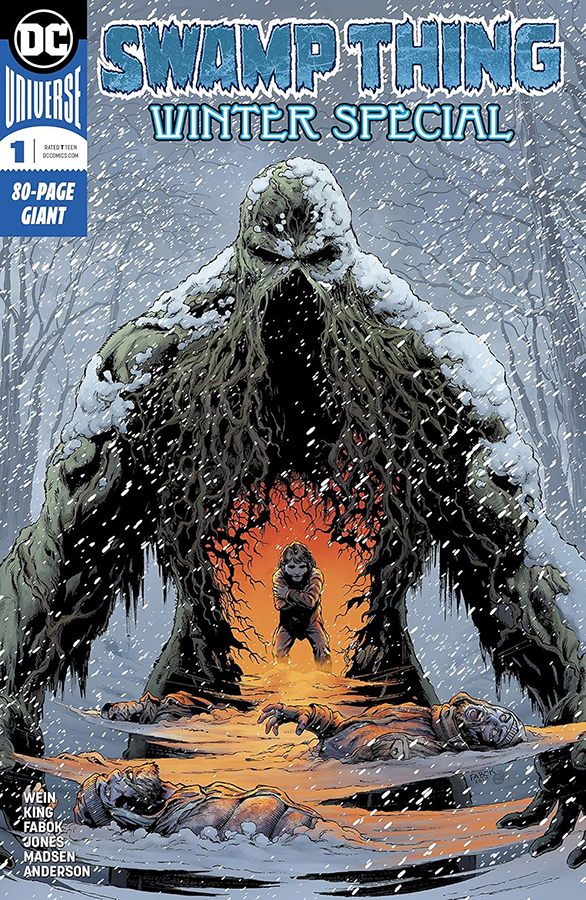
© Artist’s name, Jurgen Comics Contest, Virginia Commonwealth University, 2025 should appear at the bottom of the cover
Submissions must include a transcription of the text of your comic to aid accessibility
Email submissions to LibJurgen@vcu.edu
Judging: completed during February and March 2025
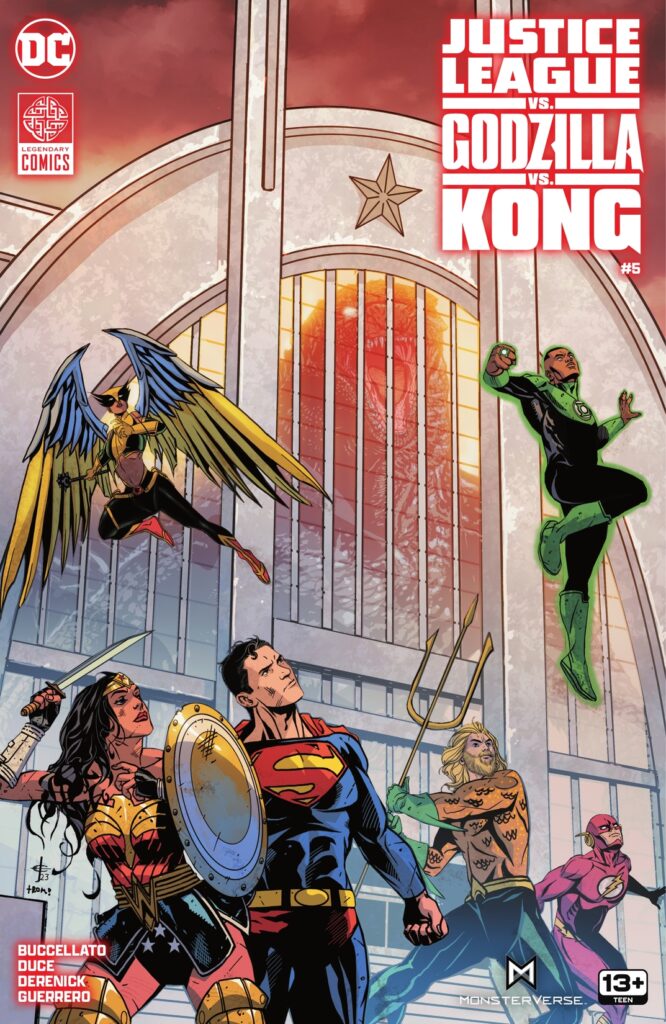
Our panel of judges may include representatives from
- Professional comic or graphic artists
- VCU Libraries
- The Cabell Associates
- VCU students
- VCU faculty
- Previous contest winners
Copyright: Artists will retain copyright to their creations, and by entering the contest grant a non-exclusive license to VCU Libraries for publication and display.
VCU Libraries reserves the right to refuse to award prizes should no entries meet the judging criteria.
Questions about the contest? Email VCU Libraries at LibJurgen@vcu.edu
Not familiar with comic book cover art. Wondering what you can do in a single page?
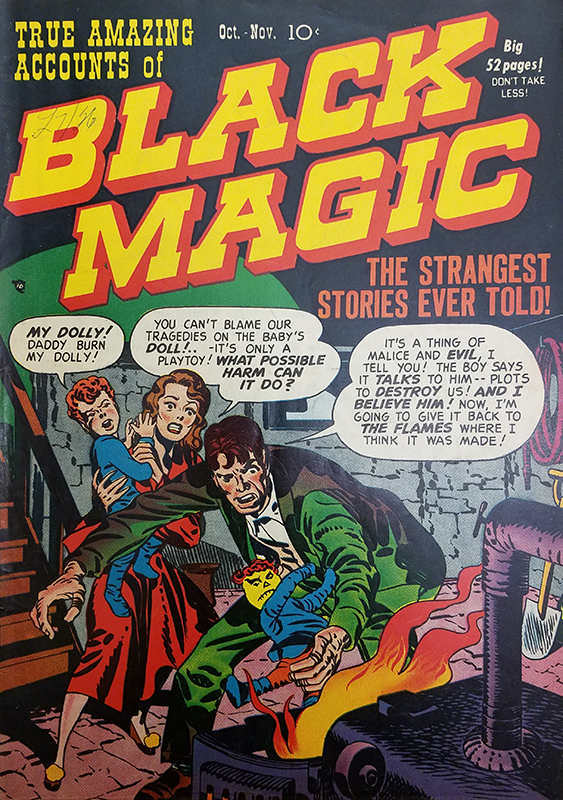 Try these links for inspiration.
Try these links for inspiration.
- Covers by the King: Jack Kirby 1917 – 2017
- Halloween Horror
- Kissing and Crying: Comic Book Romance
- Calculated to Drive You MAD
- Black Panther
- Eisner Award Winners for Best Cover Art
Explore VCU Libraries Comic Arts Collection located in Special Collections and Archives
Take a look at previous winners’ comics
Questions about the contest? Looking for a writer or artist to collaborate? Email VCU Libraries at LibJurgen@vcu.edu
About the contest
The Jurgen Banned Art Comics Contest is an annual VCU student competition dedicated to telling the story of banned art and encouraging discussion of the complex relationship between art and society. The inaugural competition (Fall 2021-Spring 2022) focused on the events and issues surrounding the banning of James Branch Cabell’s Jurgen: A Comedy of Justice. The contest is sponsored by VCU Libraries and supported by the generosity of donors, including The James Branch Cabell Library Associates.
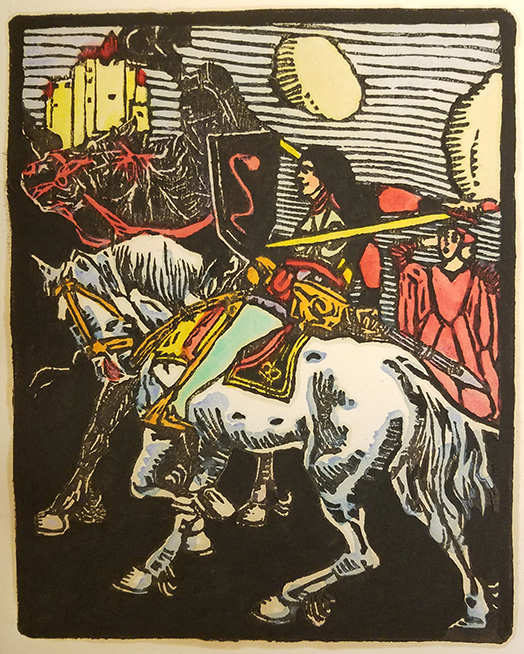
Special Collections and Archives, VCU Libraries